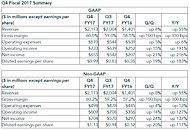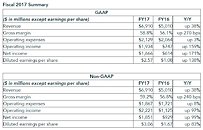- Joined
- Oct 9, 2007
- Messages
- 47,885 (7.38/day)
- Location
- Dublin, Ireland
| System Name | RBMK-1000 |
|---|---|
| Processor | AMD Ryzen 7 5700G |
| Motherboard | Gigabyte B550 AORUS Elite V2 |
| Cooling | DeepCool Gammax L240 V2 |
| Memory | 2x 16GB DDR4-3200 |
| Video Card(s) | Galax RTX 4070 Ti EX |
| Storage | Samsung 990 1TB |
| Display(s) | BenQ 1440p 60 Hz 27-inch |
| Case | Corsair Carbide 100R |
| Audio Device(s) | ASUS SupremeFX S1220A |
| Power Supply | Cooler Master MWE Gold 650W |
| Mouse | ASUS ROG Strix Impact |
| Keyboard | Gamdias Hermes E2 |
| Software | Windows 11 Pro |
NVIDIA (NASDAQ: NVDA) today reported revenue for the fourth quarter ended January 29, 2017, of $2.17 billion, up 55 percent from $1.40 billion a year earlier, and up 8 percent from $2.00 billion in the previous quarter. GAAP earnings per diluted share for the quarter were $0.99, up 183 percent from $0.35 a year ago and up 19 percent from $0.83 in the previous quarter. Non-GAAP earnings per diluted share were $1.13, up 117 percent from $0.52 a year earlier and up 20 percent from $0.94 in the previous quarter.
For fiscal 2017, revenue reached a record $6.91 billion, up 38 percent from $5.01 billion a year earlier. GAAP earnings per diluted share were $2.57, up 138 percent from $1.08 a year earlier. Non-GAAP earnings per diluted share were $3.06, up 83 percent from $1.67 a year earlier. "We had a great finish to a record year, with continued strong growth across all our businesses," said Jen-Hsun Huang, founder and chief executive officer of NVIDIA. "Our GPU computing platform is enjoying rapid adoption in artificial intelligence, cloud computing, gaming, and autonomous vehicles.


"Deep learning on NVIDIA GPUs, a breakthrough approach to AI, is helping to tackle challenges such as self-driving cars, early cancer detection and weather prediction. We can now see that GPU-based deep learning will revolutionize major industries, from consumer internet and transportation to health care and manufacturing. The era of AI is upon us," he said.
Capital Return
During fiscal 2017, NVIDIA paid $739 million in share repurchases and $261 million in cash dividends. As a result, the company returned an aggregate of $1.00 billion to shareholders in fiscal 2017.
For fiscal 2018, NVIDIA intends to return $1.25 billion to shareholders through ongoing quarterly cash dividends and share repurchases. NVIDIA will pay its next quarterly cash dividend of $0.14 per share on March 17, 2017, to all shareholders of record on February 24, 2017.
NVIDIA's outlook for the first quarter of fiscal 2018 is as follows:
Gaming:
View at TechPowerUp Main Site
For fiscal 2017, revenue reached a record $6.91 billion, up 38 percent from $5.01 billion a year earlier. GAAP earnings per diluted share were $2.57, up 138 percent from $1.08 a year earlier. Non-GAAP earnings per diluted share were $3.06, up 83 percent from $1.67 a year earlier. "We had a great finish to a record year, with continued strong growth across all our businesses," said Jen-Hsun Huang, founder and chief executive officer of NVIDIA. "Our GPU computing platform is enjoying rapid adoption in artificial intelligence, cloud computing, gaming, and autonomous vehicles.


"Deep learning on NVIDIA GPUs, a breakthrough approach to AI, is helping to tackle challenges such as self-driving cars, early cancer detection and weather prediction. We can now see that GPU-based deep learning will revolutionize major industries, from consumer internet and transportation to health care and manufacturing. The era of AI is upon us," he said.
Capital Return
During fiscal 2017, NVIDIA paid $739 million in share repurchases and $261 million in cash dividends. As a result, the company returned an aggregate of $1.00 billion to shareholders in fiscal 2017.
For fiscal 2018, NVIDIA intends to return $1.25 billion to shareholders through ongoing quarterly cash dividends and share repurchases. NVIDIA will pay its next quarterly cash dividend of $0.14 per share on March 17, 2017, to all shareholders of record on February 24, 2017.
NVIDIA's outlook for the first quarter of fiscal 2018 is as follows:
- Revenue is expected to be $1.90 billion, plus or minus two percent.
- GAAP and non-GAAP gross margins are expected to be 59.5 percent and 59.7 percent, respectively, plus or minus 50 basis points.
- GAAP operating expenses are expected to be approximately $603 million. Non-GAAP operating expenses are expected to be approximately $520 million.
- GAAP other income and expense, net, is expected to be an expense of approximately $20 million, inclusive of additional charges from early conversions of convertible notes. Non-GAAP other income and expense, net, is expected to be an expense of approximately $4 million.
- GAAP and non-GAAP tax rates for the first quarter of fiscal 2018 are both expected to be 17 percent, plus or minus one percent, excluding any discrete items.
- Weighted average shares used in the GAAP and non-GAAP diluted EPS calculations are dependent on the weighted average stock price during the quarter.
- Capital expenditures are expected to be approximately $50 million to $60 million.
Gaming:
- Introduced GeForce GTX 1050 and 1050 Ti mobile GPUs, which debuted in more than 30 gaming laptops at CES 2017.
- Launched the new SHIELD TV, integrating Google Assistant for TV, SmartThings Hub technology and the NVIDIA SPOT AI mic.
- Unveiled the GeForce NOW service, delivering an NVIDIA Pascal gaming PC, on demand, from the cloud to all computers.
- Launched NVIDIA's new workstation-product lineup with Quadro GP100, enabling a new class of supercomputing workstations.
- Introduced Quadro P5000, powering the first VR-ready mobile workstations from Dell and MSI.
- Collaborated with Microsoft to accelerate AI with a GPU-accelerated Microsoft Cognitive Toolkit available on the Microsoft Azure cloud and NVIDIA DGX-1.
- Partnered with the National Cancer Institute and the U.S. Department of Energy to build CANDLE, an AI framework that will advance cancer research.
- Unveiled the NVIDIA DGX SATURNV AI supercomputer, powered by 124 Pascal-powered DGX-1 server nodes, which is the world's most efficient supercomputer.
- Partnered with Audi, to put advanced AI cars on the road by 2020.
- Partnered with Mercedes-Benz, to bring an NVIDIA AI-powered car to the market.
- Partnered with Bosch, the world's largest automotive supplier, to bring self-driving systems to production vehicles
- Partnered with Germany's ZF, to create a self-driving system for cars, trucks and commercial vehicles based on the NVIDIA DRIVE PX 2 AI car computer.
- Partnered with Europe's HERE, to develop HERE HD Live Map into a real-time, high-definition mapping solution for autonomous vehicles.
- Partnered with Japan's ZENRIN, to develop a cloud-to-car HD map solution for self-driving cars.
View at TechPowerUp Main Site
